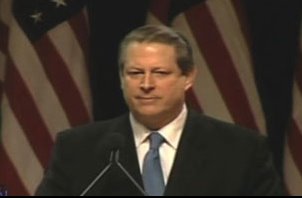Gore's Challenge
By David S. Broder
Thursday, January 19, 2006; Page A19
Former vice president Al Gore has turned himself into a one-man grand jury, ready to indict the Bush administration for any number of crimes against the Constitution. Whether you agree with Gore's conclusions or not, the speech that the 2000 Democratic nominee for president gave this week in Washington was as comprehensive a rundown of George W. Bush's ventures to the limits of executive authority as anyone could hope to find.
Gore is hardly an objective observer. Having outpolled Bush in the popular vote only to see his apparent victory taken from him by a divided Supreme Court, Gore cannot be expected to be dispassionate about the way Bush is operating as president. His speech is just an indictment. The proof of the charges can come only in congressional hearings and, ultimately, in the courts.
But even after discounting for political motivations, it seems to me that Gore has done a service by laying out the case as clearly and copiously as he has done. His overall charge is that Bush has systematically broken the laws and bent the Constitution by his actions in the areas of national security and domestic anti-terrorism. He is not the first to make that complaint. My e-mail has included many messages from people who have leaped far ahead of the evidence and concluded that Bush should be impeached and removed from office for actions they deem illegal.
Gore stops well short of that point and contents himself with citing the cases that cause many others concern. The first -- and to my mind weakest -- instance is the claim that Bush took the nation to war on the basis of false intelligence about Iraq's weapons of mass destruction. But there is no clear evidence as yet that Bush willfully concocted or knowingly distorted the intelligence he received about Saddam Hussein's military programs. Interpretations of that intelligence varied within the government, but the Clinton administration, of which Gore was an important part, came to the same conclusions that Bush did -- and so did other governments in the Western alliance.
It is a reach to attempt to make a crime of a policy misjudgment.
But the other cases Gore cited are more troubling. The Abu Ghraib prison abuse scandal, for which only low-level military personnel have been punished, traces back through higher and untouched levels of command to the Pentagon, the Justice Department and the White House, all of which failed in their duties to ensure that the occupation forces were adhering to recognized international standards for the treatment of prisoners.
Similarly, the administration's resistance to setting and enforcing clear prohibitions on torture and inhumane treatment of detainees in the war on terrorism raises legitimate questions about its willingness to adhere to the rule of law. From the first days after Sept. 11, Bush has appeared to believe that he is essentially unconstrained. His oddly equivocal recent signing statement on John McCain's legislation banning such tactics seemed to say he could ignore the plain terms of the law.
If Judge Samuel Alito is right that no one is above the law, then Bush's supposition deserves to be challenged.
Gore's final example -- on which he has lots of company among legal scholars -- is the contention that Bush broke the law in ordering the National Security Agency to monitor domestic phone calls without a warrant from the court Congress had created to supervise all such wiretapping. If -- as the Justice Department and the White House insist -- the president can flout that law, then it is hard to imagine what power he cannot assert.
Senate Judiciary Committee Chairman Arlen Specter has summoned Attorney General Alberto Gonzales to a hearing on the warrantless wiretap issue, and that hearing should be the occasion for a broad exploration of the willingness of this administration to be constrained by the Constitution and the laws.
The committee should keep the attorney general on the witness stand as long as it takes -- as long as it spent examining the qualifications of Judge Alito and Chief Justice John Roberts, if it comes to that. The stakes for the country are that high.
Gore is certainly right about one thing. When he challenged the members of Congress to "start acting like the independent and co-equal branch of government you're supposed to be," he was issuing a call of conscience that goes well beyond any partisan criticism.
davidbroder@washpost.com


Comments on "OpEd (David Broder): Gore's Challenge"
-
 TeresaInPa (@ 1/22/2006 4:49 AM) said:
TeresaInPa (@ 1/22/2006 4:49 AM) said:
Post a commentARG.... Broder's first comment indicates there is still some work to do with him.
But the rest was good.